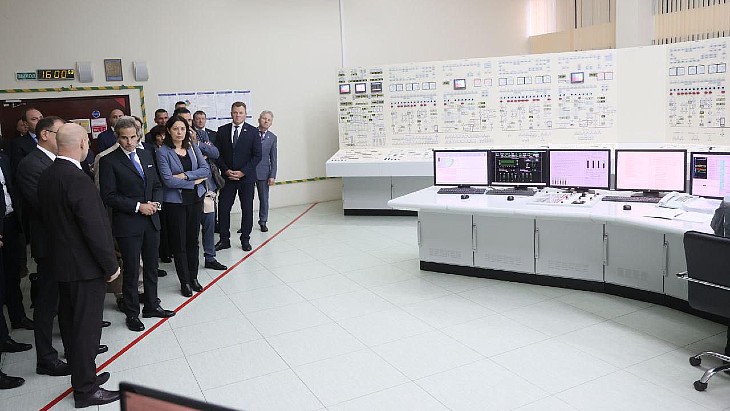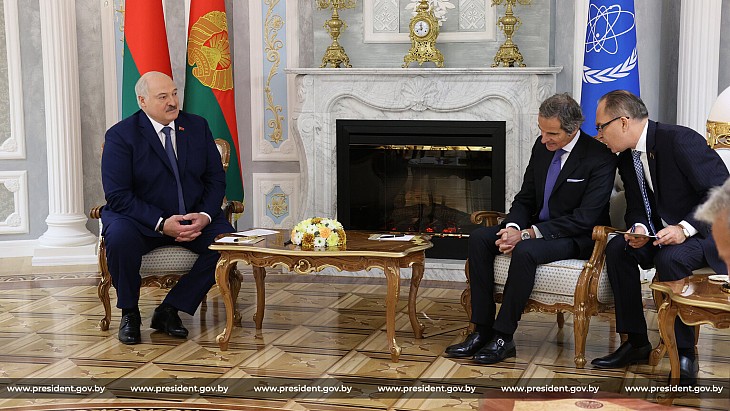The two men held talks on Tuesday during a visit by the head of the IAEA to the country, which also included a tour of Belarus's first nuclear power plant, which has been providing 25% of the country's electricity since its second unit entered commercial operation last year.
Lukashenko praised the work of the agency "related to the safety of nuclear power plants, especially those plants that actually ended up in the combat zone - Zaporizhzhia and Kursk" and added "you should know that we are committed to security, peace and we will do everything we can, everything that depends on us, to ensure regional nuclear security".
He then said there had been suggestions Belarus wanted to seize the Chernobyl nuclear power plant site, about 20 kilometres across its border with Ukraine, and said the idea was "complete stupidity ... we did not build, we did not service and we did not blow up. And the main disaster fell on a quarter of our territory. And we are still struggling with the consequences of the Chernobyl disaster". The Chernobyl nuclear power plant was built when Belarus and Ukraine were part of the Soviet Union. Since the accident in 1986, there has been an exclusion zone around the plant including areas on both sides of the border. It was occupied by Russian forces for 35 days at the start of the Russian-Ukrainian war in February 2022.
The president added that the country was looking forward to continuing to work with thje IAEA in the future on the safety and operation of its nuclear units and said they would be willing to share their experience with the IAEA and any country thinking of embarking on a nuclear energy programme because, referring to the country's nuclear power plant, "we built it, figuratively speaking, from scratch. We had no specialists, no experience, no knowledge in operating a nuclear power plant. But we learned this, trained specialists in time".
The presidential website's report of the meeting quoted Grossi as saying: "I am particularly pleased to hear that at the highest level - at the level of the head of state - the most serious commitment to ensuring nuclear safety is being expressed. This says a lot - first of all, about the professionalism that your country has, having gone through a long path to becoming a power producing nuclear energy ... and it serves as an example of how a country can work with the agency, how closely it can interact with experts and missions of our organisation and show, in particular, the openness of your country" to the issue of nuclear safety.
The official Belta news agency reported Grossi as telling reporters afterwards: "We discussed a number of very important issues in an open and trusting atmosphere. First of all, this concerned the delicate situation in the region, the conflict in Ukraine, the challenges and dangers that the situation in the region poses. I was able to inform Mr President in detail about the work of the IAEA, which our agency has been conducting since the very beginning of the conflict, to ensure nuclear safety at nuclear power plants in Ukraine."
Deputy Prime Minister of Belarus Viktor Karankevich, former Energy Minister, said, after the visit to the Belarusian nuclear power plant in Ostrovets: "Interaction with the agency will continue ... we have already started preparing the next IAEA mission on operational safety ... we intend to expand our cooperation in new areas, including in the field of radioactive waste management. The experience and achievements of the world community will be used in the framework of the project to build a national burial site for radioactive waste."

The IAEA director general during the site visit (Image: IAEA)
Grossi called it "a great honour and joy for me to finally visit Ostrovets after so many years of working together on this project ... the IAEA was involved in the Belarusian NPP project ... from the very beginning - on issues of choosing the location of the plant, developing rules for interaction in emergency situations, work in the initial operational stage. Now we have the opportunity to talk about supporting the plant ... we are ready to continue our communication within the framework of interaction on waste processing issues".
Nuclear power in Belarus
The existing Belarus nuclear power plant is located in Ostrovets in the Grodno region. A general contract for the construction was signed in 2011, with first concrete in November 2013. Rosatom began construction of unit 2 in May 2014. There are now six VVER-1200 reactors in operation in total, with four in Russia. The first Ostrovets power unit was connected to the grid in November 2020 and, the energy ministry says, the plant will produce about 18.5 TWh of electricity per year, equivalent to 4.5 billion cubic metres of natural gas, with an annual effect on the country's economy of about USD550 million. The second unit was put into commercial operation on 1 November 2023. Together they are generating about one-quarter of the country's electricity.
The country has been considering the option of a second nuclear power plant, with Karankevich saying in December 2023 that experts were looking into the costs and the requirements for future electricity capacity growth, saying: "We intend to reach 44 billion kWh of electricity in 2025. By 2030 we have to reach 47 billion kWh ... as we decide in favour of the second nuclear power plant or the third unit (at Ostrovet), we have to analyse the year 2040 instead of 2030 or 2035." He said that if a second nuclear power plant was built, Belarus would become a world leader in terms of share of its energy which comes from nuclear.







_97013.jpg)
_51413.jpg)






